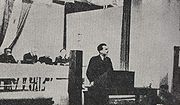
Josip Vidmar
Encyclopedia

Slovenia
Slovenia , officially the Republic of Slovenia , is a country in Central and Southeastern Europe touching the Alps and bordering the Mediterranean. Slovenia borders Italy to the west, Croatia to the south and east, Hungary to the northeast, and Austria to the north, and also has a small portion of...
n literary critic and essayist. Vidmar is remembered because of his role in the Slovenian resistance
Liberation Front of the Slovenian People
On 26 April 1941 in Ljubljana the Anti-Imperialist Front was established. It was to promote "an international massive movement" to "liberate the Slovenian nation" whose "hope and example was the Soviet Union"...
during World War II
World War II
World War II, or the Second World War , was a global conflict lasting from 1939 to 1945, involving most of the world's nations—including all of the great powers—eventually forming two opposing military alliances: the Allies and the Axis...
, and for his influence in the cultural policies of the Titoist regime in Slovenia from the mid 1950s to the mid 1970s.
He was born in Ljubljana
Ljubljana
Ljubljana is the capital of Slovenia and its largest city. It is the centre of the City Municipality of Ljubljana. It is located in the centre of the country in the Ljubljana Basin, and is a mid-sized city of some 270,000 inhabitants...
, in a progressive
Progressivism
Progressivism is an umbrella term for a political ideology advocating or favoring social, political, and economic reform or changes. Progressivism is often viewed by some conservatives, constitutionalists, and libertarians to be in opposition to conservative or reactionary ideologies.The...
middle class family. His older brother was Milan Vidmar
Milan Vidmar
Milan Vidmar was a Slovene electrical engineer, chess player, chess theorist, philosopher, and writer. He was a specialist in power transformers and transmission of electric current.- Biography :...
, the famous engineer and chess player. In the interwar period, he rose to prominence with his critical essays on literature and politics. In 1933, he published the essay The Cultural Problem of Slovene Idenitity, in which he rejected the centralist policies in the Kingdom of Yugoslavia
Kingdom of Yugoslavia
The Kingdom of Yugoslavia was a state stretching from the Western Balkans to Central Europe which existed during the often-tumultuous interwar era of 1918–1941...
, aimed at the creation of a Yugoslav cultural and political nation.
Shortly after the Nazi invasion of Yugoslavia
Invasion of Yugoslavia
The Invasion of Yugoslavia , also known as the April War , was the Axis Powers' attack on the Kingdom of Yugoslavia which began on 6 April 1941 during World War II...
in April 1941, he was among the co-founders of the Liberation Front of the Slovenian People
Liberation Front of the Slovenian People
On 26 April 1941 in Ljubljana the Anti-Imperialist Front was established. It was to promote "an international massive movement" to "liberate the Slovenian nation" whose "hope and example was the Soviet Union"...
(Osvobodilna fronta) and served as its formal chairman until the end of the war. After the war he was president of the Yugoslav Federal Chamber of Peoples (later the Chamber of Republics and Provinces). From 1944 to 1946 he was chairman of the Slovenian Parliament. From 1952 to 1976 Vidmar was President of the Slovenian Academy of Sciences and Arts
Slovenian Academy of Sciences and Arts
The Slovenian Academy of Sciences and Arts is the national academy of Slovenia, which encompasses science and the arts and brings together the top Slovene researchers and artists as members of the academy....
and head of the Research Centre of the Academy (1950–1964).
He was close friend to croatian writer Miroslav Krleža
Miroslav Krleža
Miroslav Krleža was a leading Croatian and Yugoslav writer and the dominant figure in cultural life of both Yugoslav states, the Kingdom and the Republic . He has often been proclaimed the greatest Croatian writer of the 20th century.-Biography:Miroslav Krleža was born in Zagreb, modern-day...
.
He translated works from Russian, French, Italian, German, Czech, Croatian and Serbian to Slovenе, mostly plays; works of dramatists: Aleksey Arbuzov, Gogol
Nikolai Gogol
Nikolai Vasilievich Gogol was a Ukrainian-born Russian dramatist and novelist.Considered by his contemporaries one of the preeminent figures of the natural school of Russian literary realism, later critics have found in Gogol's work a fundamentally romantic sensibility, with strains of Surrealism...
, Griboyedov
Alexandr Griboyedov
Aleksander Sergeyevich Griboyedov was a Russian diplomat, playwright, poet, and composer. He is recognized as homo unius libri, a writer of one book, whose fame rests on the brilliant verse comedy Woe from Wit , still one of the most often staged plays in Russia...
, Krleža
Miroslav Krleža
Miroslav Krleža was a leading Croatian and Yugoslav writer and the dominant figure in cultural life of both Yugoslav states, the Kingdom and the Republic . He has often been proclaimed the greatest Croatian writer of the 20th century.-Biography:Miroslav Krleža was born in Zagreb, modern-day...
, Molière
Molière
Jean-Baptiste Poquelin, known by his stage name Molière, was a French playwright and actor who is considered to be one of the greatest masters of comedy in Western literature...
, Nušić
Branislav Nušic
Branislav Nušić was a Serbian novelist of Aromanian descent, playwright, satirist, essayist and founder of modern rhetoric in Serbia. He also worked as a journalist and a civil servant.- Biography :...
, Pushkin, Aleksey Tolstoy
Aleksey Konstantinovich Tolstoy
Count Aleksey Konstantinovich Tolstoy, often referred to as A. K. Tolstoy , was a Russian poet, novelist and playwright, considered to be the most important nineteenth-century Russian historical dramatist...
and other authors.
He died in Ljubljana.
Essays
- Literarne kritike
- Meditacije
- Polemike
- Dnevniki
- Obrazi

